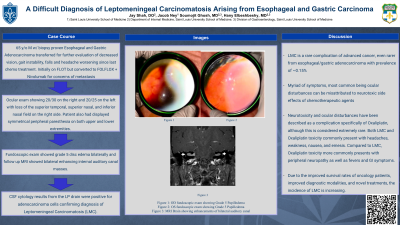Sunday Poster Session
Category: Esophagus
P0469 - A Difficult Diagnosis of Leptomeningeal Carcinomatosis Arising From Esophageal and Gastric Adenocarcinoma
Sunday, October 22, 2023
3:30 PM - 7:00 PM PT
Location: Exhibit Hall

Has Audio
- JS
Jay Shah, DO
Saint Louis University
St. Louis, MO
Presenting Author(s)
Jay Shah, DO, Jacob Ney, BS, Ryan Plunkett, MD, Soumojit Ghosh, MD, Hany Elbeshbeshy, MD
Saint Louis University, St. Louis, MO
Introduction: Leptomeningeal Carcinomatosis (LMC) is a rare phenomenon and occurs when a tumor is spread from its original site to the meningeal covering and subarachnoid space. Commonly associated with tumors arising from the breast, lung, melanoma and GI system. Our case demonstrates how LMC’s clinical presentation may be confounded by common neurotoxic effects of chemotherapeutic agents.
Case Description/Methods: A 65-year-old male with esophageal and gastric adenocarcinoma presented with vision changes, dizziness and headache. He was initially diagnosed 3 years prior and treated with FLOT but was followed by palliative chemotherapy with FOLFOX plus nivolumab as his condition progressed. During palliative chemotherapy, he was noted to have blurry vision and gait instability, which would resolve between cycles. Prior to admission, his neurologic symptoms included hearing loss, dizziness, gait instability with falls, and retro-orbital headaches concerning oxaliplatin-induced neuropathy. On presentation, vitals were stable and the physical exam was notable for loss of superior temporal, superior nasal, and inferior nasal field on the right side. He also displayed symmetrical peripheral paresthesia on all extremities. Fundoscopic exam showed grade 5 disc edema bilaterally. MRI showed bilateral enhancing internal auditory canal masses. The patient was then started on high dose steroids and acetazolamide to reduce intracranial pressure. A lumbar puncture (LP) was performed and discovered an elevated opening pressure of 37 mmHg and cytology positive for adenocarcinoma, confirming the diagnosis of LMC over oxaliplatin-induced neuropathy. He was unfortunately discharged on hospice and eventually passed away.
Discussion: Due to improved survival rates of cancer patients, improved diagnostic modalities, and novel treatments, the incidence of LMC is increasing. New focal neurological deficits or vision changes in patients with gastrointestinal malignancies should alert providers to evaluate for central nervous system involvement for prompt diagnosis and treatment. Both LMC and oxaliplatin toxicity commonly present with headaches, weakness, nausea, and emesis, but oxaliplatin toxicity more commonly presents with peripheral neuropathy, fevers and/or GI symptoms. Since chemotoxicity and LMC metastasis may have overlapping presentations, this case shows the importance of further evaluation for progression of primary GI cancers to LMC in the presence of neurologic changes.
Disclosures:
Jay Shah, DO, Jacob Ney, BS, Ryan Plunkett, MD, Soumojit Ghosh, MD, Hany Elbeshbeshy, MD. P0469 - A Difficult Diagnosis of Leptomeningeal Carcinomatosis Arising From Esophageal and Gastric Adenocarcinoma, ACG 2023 Annual Scientific Meeting Abstracts. Vancouver, BC, Canada: American College of Gastroenterology.
Saint Louis University, St. Louis, MO
Introduction: Leptomeningeal Carcinomatosis (LMC) is a rare phenomenon and occurs when a tumor is spread from its original site to the meningeal covering and subarachnoid space. Commonly associated with tumors arising from the breast, lung, melanoma and GI system. Our case demonstrates how LMC’s clinical presentation may be confounded by common neurotoxic effects of chemotherapeutic agents.
Case Description/Methods: A 65-year-old male with esophageal and gastric adenocarcinoma presented with vision changes, dizziness and headache. He was initially diagnosed 3 years prior and treated with FLOT but was followed by palliative chemotherapy with FOLFOX plus nivolumab as his condition progressed. During palliative chemotherapy, he was noted to have blurry vision and gait instability, which would resolve between cycles. Prior to admission, his neurologic symptoms included hearing loss, dizziness, gait instability with falls, and retro-orbital headaches concerning oxaliplatin-induced neuropathy. On presentation, vitals were stable and the physical exam was notable for loss of superior temporal, superior nasal, and inferior nasal field on the right side. He also displayed symmetrical peripheral paresthesia on all extremities. Fundoscopic exam showed grade 5 disc edema bilaterally. MRI showed bilateral enhancing internal auditory canal masses. The patient was then started on high dose steroids and acetazolamide to reduce intracranial pressure. A lumbar puncture (LP) was performed and discovered an elevated opening pressure of 37 mmHg and cytology positive for adenocarcinoma, confirming the diagnosis of LMC over oxaliplatin-induced neuropathy. He was unfortunately discharged on hospice and eventually passed away.
Discussion: Due to improved survival rates of cancer patients, improved diagnostic modalities, and novel treatments, the incidence of LMC is increasing. New focal neurological deficits or vision changes in patients with gastrointestinal malignancies should alert providers to evaluate for central nervous system involvement for prompt diagnosis and treatment. Both LMC and oxaliplatin toxicity commonly present with headaches, weakness, nausea, and emesis, but oxaliplatin toxicity more commonly presents with peripheral neuropathy, fevers and/or GI symptoms. Since chemotoxicity and LMC metastasis may have overlapping presentations, this case shows the importance of further evaluation for progression of primary GI cancers to LMC in the presence of neurologic changes.
Disclosures:
Jay Shah indicated no relevant financial relationships.
Jacob Ney indicated no relevant financial relationships.
Ryan Plunkett indicated no relevant financial relationships.
Soumojit Ghosh indicated no relevant financial relationships.
Hany Elbeshbeshy indicated no relevant financial relationships.
Jay Shah, DO, Jacob Ney, BS, Ryan Plunkett, MD, Soumojit Ghosh, MD, Hany Elbeshbeshy, MD. P0469 - A Difficult Diagnosis of Leptomeningeal Carcinomatosis Arising From Esophageal and Gastric Adenocarcinoma, ACG 2023 Annual Scientific Meeting Abstracts. Vancouver, BC, Canada: American College of Gastroenterology.
